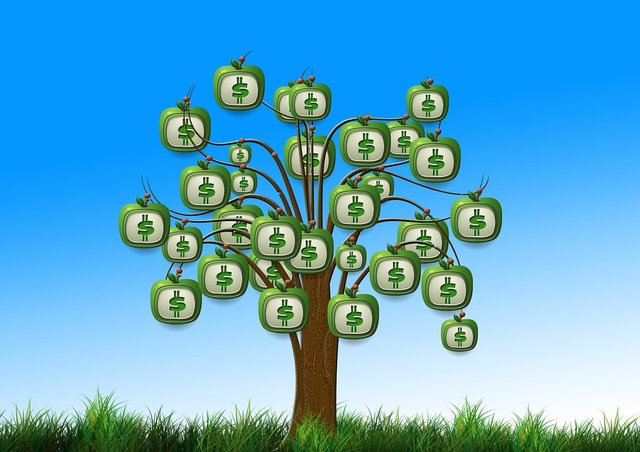Steem, Democracy, and Modern-Day Capitalism
Back in my university days, as the courses that I took are mostly social sciences, I had a bit of time studying market economies and government systems. From democracies to authoritarian governments, from socialist to free-market economies, I have more or less touched those subjects in the course of my studies. Having lived in the Philippines for more than three decades before I moved to New Zealand with my wife, I have this bias towards democratic and capitalist societies every time those lines of thoughts are being brought into the discussion. In this regard, being an active member in Steem, I want to present something that I thought is relevant to Steem and how it relates to my thoughts in democratic and capitalist economies.

Source
Steem Democracy
I always see Steem as being democratic. The simple way I define democracy is it is the opposite of an authoritarian regime. In Steem, people have the freedom to write and comment the way they want to. But like in democratic states, the liberties that we enjoy come with the responsibility and accountability to act within the what is allowed. You cannot write plagiarized content, or infringe on anyone’s work without acknowledging them. Penalties come into play – you will be given downvotes or be blacklisted – the same way you are penalized in real-life situations when you violate the law – fines, prison time, etc.
Steem Capitalism
Steem operates the same way as a capitalist economy. In state economies, capital can be finances, natural resources, intellectual capital, human resources, and many more. In Steem, capital can be your Steem, or Steem Power (SP) or your intellectual capital – that is, your ability to write high quality content which can garner enormous amount of upvotes which translate eventually to Steem (and Steem Power should you choose to power up). In Steem, one’s success or failure is determined by how you take advantage of this capital economy – whether it is Steem Power or your writing prowess.

Source
For most people, it will be the Steem Power. As those who have the means can just buy Steem and convert it to SP to be a player in the Steem economy. Not all has the talent to write, much more to write quality content that will attract the attention of big curators. And even if you have the capacity to write, your rewards will more likely be converted to SP and use them for curating other content in order to get more gains rather than by to depend only with rewards coming from writing posts.
My wife and I like to watch home renovation shows. One of the TV shows that we always watch is The Block. There is an Australian and a New Zealand version of this show. It features pairs of contestants who will renovate a block (usually an apartment block) and week by week, they will build a part (or parts) of the house assigned to them. At the end of each week (which is called The Room Reveal), the judges will score each room and whoever gets the highest number will be the winner. The winning pair will get cash prices to be added to their overall budget and/or other advantage going on to the next rounds.
Why did I mention this show? It is because the show highlights how capital (the renovation budget in this case) plays a big role in the outcome of the show. When a team wins a Room Reveal and gets additional cash price, they can use that money to buy more furniture and building supplies, or pay more tradies (e.g. builders, painters, tilers, etc.) which will be an additional advantage moving onto the next Room Reveal. The more money you have, the more things you can do, the more things you can do, the better chances of winning the next round.

Source
It is the same environment in Steem, the more SP you have, the greater rewards you get compared to another user who has used the same voting power but has lesser SP. Ceteris Paribus (it is a Latin phrase which means all other things being constant, and is a common term used in economics), people with bigger SPs will outperform people with smaller SPs. With more rewards, you can use them to buy tools and resources to increase your earnings. Even recovering your voting power takes faster for those with largers SPs.
Modern-Day Capitalism
In a capitalist economy, you have your producers and consumers. Producers manufacture the goods while consumers as their name implies, consume the goods produced. In Steem, the producers are the content authors. On the other hand, consumers are the curators. In a perfect sense, it is not only the curators, it also includes all the other readers of that content regardless if it is being curated or not. But for the purpose of this analogy, I will just focus on the curators as the consumers of content. In a normal economy, you spend money to buy good and you get what you pay for. However, the good thing about Steem is that you don’t really need to spend to “consume (curate)” content. When you upvote something, you are only using your voting power which you can recover in an appropriate time period. So it’s like going inside a store, buying something without really giving the money to the store and the State (which is in this case the Steem blockchain) will give both of you a percentage of what you pledge to spend for that product. The State just set some restrictions on how many times you can pledge in a day (voting mana) depending on how much you pledge to spend (voting power).

Source
Capitalism for me is another way for wealth creation. You use capital to earn, and use those earnings as capital to get more earnings. I see Steem (and most like all other cryptocurrencies) as a way to create wealth which we haven’t thought possible probably twenty years ago. For instance, if my 100% vote is worth $50 and I upvoted someone’s post, at 50/50 share, I can earn $25 out of that vote, and so is the author of the post I upvoted. It’s like taking a rabbit out of a hat. That click of a mouse (the upvote) generated wealth in an instant. I remember the time the domain sex.info was sold for $14 million USD. It may be arbitrary like any other names, but that name alone was worth more than hundreds of people can earn throughout their lifetime. Bitcoin for instance, critics will say it is just a bunch of binary codes and does not really offer something tangible. I certainly agree to that, it is just computer code, which makes up the blockchain, but that code translate to billions of dollars. There are many people who have become millionaires through this economy which probably won’t happen had they continue to work in the traditional economies that we know.

Source
The challenge for everyone is to learn how to be a part of this modern-day economy and have a slice of the wealth it generates. Traditional economies are starting to embrace this paradigm and do not let yourself be left out of the pack. Take a read, have a go, and share the ride with us.
I hope you learn something with my analogies and I appreciate your feedback by commenting below.
A Little About Me
Please feel free to follow my account if you like my post.

Steem is an oligarchy...
It is not in it's code to operate any other way.
Oligarchies in free markets stifle growth.
Capitalism and free markets can be synonymous - but not always (as we see in the western government controlled 'free market capitalism'. And oligarchies)
Well, you created a very fine and interesting "product" for me to "consume" as a curator... and I am doing so because it provided something I felt was highly worthwhile.
Ideally, that's how free-market capitalism in a democracy should work.
The challenge is that we often see — both in society at large, and in a microcosm such as Steemit — a tendency for those with power (and sometimes those without, as well) to exploit the system, rather than merely use it to their benefit as it was designed. And so, "pseudo-monopolies" (think Wal-Mart, Amazon or even Steemit "whales") create an environment where the "barrier to entry" for the small person is not centered on merit anymore, but on being able to push your competition out of the way, or into bankruptcy.
Still, a great essay you wrote!
=^..^=
From a society point of view I don't think "pseudo-monopolies" are a problem provided that the laws are not constructed in a way to favor these big businesses. Often they are. It's funny you mention Wal-Mart and Amazon as "pseudo-monopolies" given that they are direct competitors. Just because a company is very large doesn't mean they are monopolies or even "pseudo-monopolies". As long as there are not artificial barriers to market entry (e.g. regulations new businesses have to follow that large ones get exemption to, etc.) then the market will regulate itself. Blockbuster failed when Netflix replaced it. Now there are many online streaming services despite Netflix dominating the market for a time. Malls replaced "mom and pop shops" which were in turn replaced by online sales. Wal-Mart replaced local grocery stores (well, personally I still shop at Publix) and now Amazon competes strongly with them. Plus there is the natural food trend that has caused all kinds of more specialized stores to pop up.
From a Steem perspective, it is a little different. It is an ecosystem created out of thin air with all or nearly all of the resources owned initially by the creators. It was always going to take time for wealth distribution to happen but I think it slowly has been. The real question is how big is the market for content creators? How willing are people going to be in the long run to accept Steem as currency? Steem is market driven, not democracy driven. Related things perhaps (especially in terms of free markets) but not exactly the same. Steem is more like a business controlled by its stakeholders. Those with the most stake get the most say in how it is run. But this is how a free market works. It doesn't work otherwise. Why keep adding stake if it doesn't help you? It isn't a charity.
What you say is definitely true; my main point is that there is a difference between functional barriers to entry, and effective barriers to entry. In most cases it's a free economy, and there is absolutely nothing (functionally speaking) stopping me from jumping into the market and competing with Amazon and Wal-Mart. But the fact that I can at best expect to maybe make $2 an hour doing so, effectively serves as a barrier to entry, because I can't live on $2 an hour. Economists and economic theorists tend to overlook that because it's not a quantifiable fact.
For example, I love the idea of only buying and eating organic eggs, but right now I can get a dozen "regular" eggs at Safeway for 89 cents on sale, and the organic farm eggs are $5 a dozen. And because I can only make aforesaid $2/hr in the giant company market, I can only afford the 89-cent eggs, so the cycle sustains itself.
The ironic thing (I have been self-employed for almost 40 years) seems to be that the only time you can make money at something (as an individual) is before anybody gets wind of the fact that you can make money at whatever it is you are doing.
=^..^=
But any competition is an effective (to some degree or another) barrier to entry. That's just part of free market dynamics. What drives prices down is competition. Having to price your product lower is an effective barrier. Lower salaries/profit may be a result but so are lower prices.
In order to make money working for others you have to work in a field that has high demand relative to supply. People sometimes have this idea about a living wage or whatever and while it is a nice idea, at the end of the day, your labor is worth what the market will bear and not every job provides the type of compensation that you can build a life with. However, artificially raising it just leads to a never-ending cycle...higher wages=higher prices=demand for higher wages rinse and repeat. Or it leads to lower employment levels. Today there are lots of things you can do to make a decent amount of money. Become a computer engineer or a plumber or electrician or whatever else there is high demand for. Not every high paying job requires a college education.
Retail is not going to do it unless you are very good at what you do and you are making a commission on high dollar items.
Effective barriers to entry into a particular market are overcome by innovation. If you aren't bringing anything new or unique to the table then yeah, it's hard to compete. It's always been hard. You aren't going to start a small business and compete with Amazon selling everything under the sun overnight. However, if you specialize you might compete just fine. Depends on the specialty and how you set yourself apart from Amazon of course. There are an awful lot of places to buy stuff on the Internet and I tend to doubt the owners of all those companies are making $2/hr.
Your right that the only time you can really make money doing something (at least good money) is when everyone else hasn't figured out you can. But this is exactly the dynamic that has made everyone richer in effect (in the sense that they can afford more stuff because prices are lower). If you were the only one making money doing what you were doing we would call that a monopoly, right? Then it's likely far fewer people could afford whatever service you provide or products you sell. It's that competition that changes that. The constant innovation required to complete is largely what has led us to our current state of prosperity. It's hard to look back in time and find somewhere you would be better off.
However, the idea that big business dominates is somewhat of a myth anyway. Approximately 50% of all private sector jobs are created by small businesses. It's been that way for a long time.
Because resources are not unlimited, we are never going to have a system in which everybody is rich or even one where everyone has "enough". Though the poor continue to be better off than they were in the past and no system has come close to bringing as much prosperity to the world as the free market. It isn't perfect but I don't think you can make it better.
Thank you for your comment. Yes I do agree. While I believe that capitalism is still the best economic system, if the big players are consumed by greed and lust for more money, it will only widen the gap between the haves and the have-nots. And it will make it difficult for the small players to thrive and establish themselves. Those pseudo-monopolies also happen when big companies buy out smaller ones before the latter get bigger to challenge established businesses. "Eliminate the threat" as they say.
Congratulations @leoneil! You have completed the following achievement on the Steem blockchain and have been rewarded with new badge(s) :
You can view your badges on your Steem Board and compare to others on the Steem Ranking
If you no longer want to receive notifications, reply to this comment with the word
STOPTo support your work, I also upvoted your post!
Do not miss the last post from @steemitboard:
Vote for @Steemitboard as a witness to get one more award and increased upvotes!